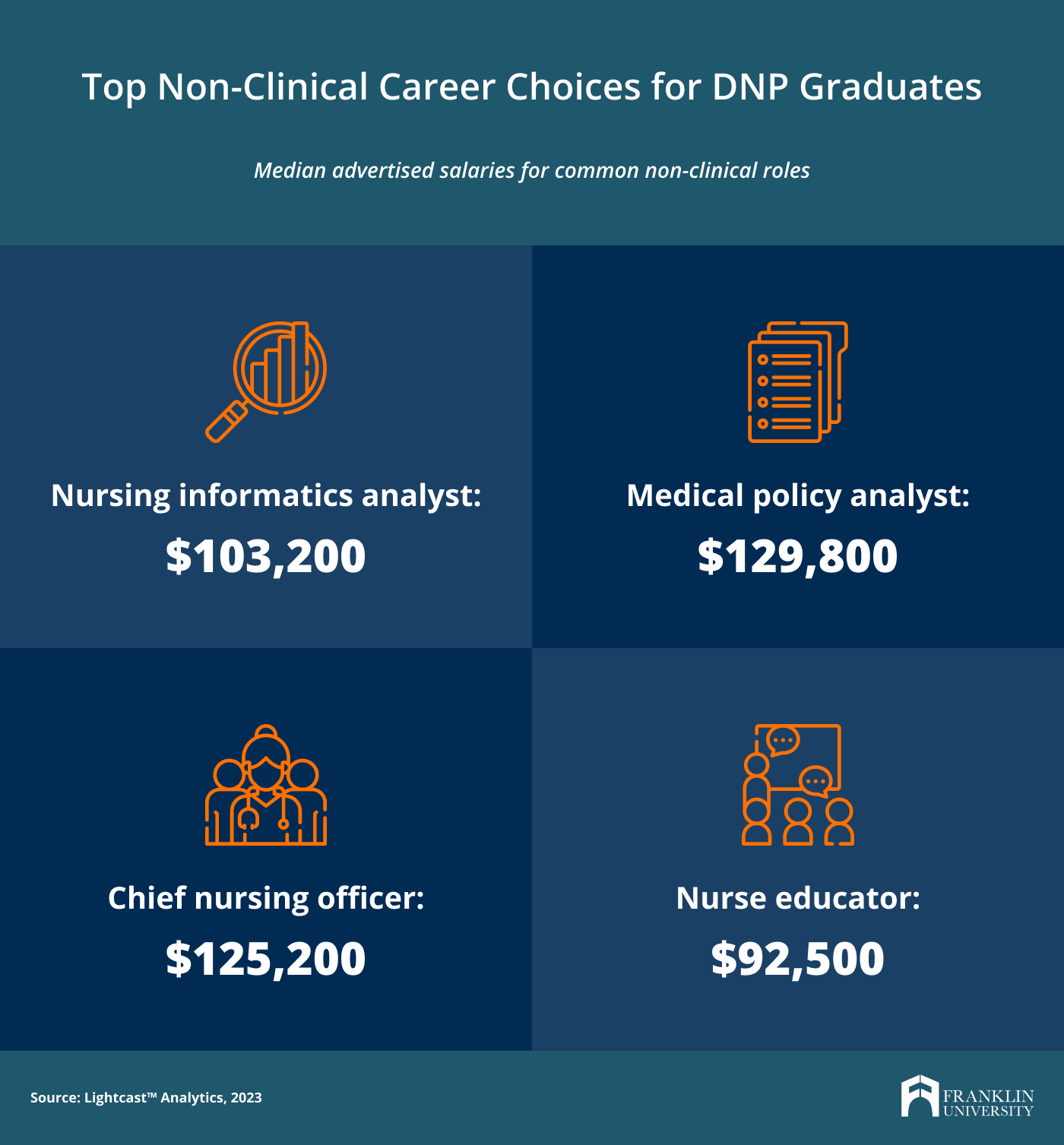Request Information
We're Sorry
There was an unexpected error with the form (your web browser was unable to retrieve some required data from our servers). This kind of error may occur if you have temporarily lost your internet connection. If you're able to verify that your internet connection is stable and the error persists, the Franklin University Help Desk is available to assist you at helpdesk@franklin.edu, 614.947.6682 (local), or 1.866.435.7006 (toll free).
Just a moment while we process your submission.

What Salary Can a Doctor of Nursing Practice Earn?
As the COVID-19 pandemic reminded us, healthcare professionals are – and always will be – essential. And in our increasingly complex healthcare system, there’s more need than ever for practitioners who hold not only clinical expertise but also the perspective and knowledge to drive improved outcomes and quality of care.
One way to gain that understanding, and prepare for a wide range of leadership roles in healthcare, is to earn a Doctor of Nursing Practice (DNP) degree. But what exactly can you do with a DNP, and what salary can you make in those roles?
What Are the Benefits of a DNP?
As the highest-level practice-focused degree available to nurses, a DNP positions you as an expert in the field. It allows you to develop specialized skills in your area of interest within the healthcare field and to understand and apply the latest research to your practice.
DNP degrees (or comparable doctorates) are a requirement for some nursing jobs, like nurse anesthetist positions, and are increasingly seen as the educational standard for nurse practitioners. Even if you aren’t seeking a role that specifically requires a DNP, the degree can help you stand out from the competition and advance into leadership positions inside and outside the clinical setting. In many cases, accessing these higher-level roles can also help you earn a higher salary.
According to Debbie Conner, Ph.D., MSN, ANP/FNP-BC, FAANP, program chair of Franklin University’s Doctor of Nursing Practice program, nurses pursue DNP degrees for many reasons.
“Some want to follow the initiative [endorsed by organizations including the American Association of Colleges of Nursing (AACN) and National Organization for Nurse Practitioner Faculties] that all advanced practice registered nurses have the DNP by 2025,” she explained. “Others are or want to be leaders in their organization or the nursing profession and want to learn the higher skills that a doctoral degree provides. Many are interested in quality improvement and appreciate the opportunity to conduct a scholarly project to address a gap in practice, policy, or process. And, often, a nurse would simply like to have a terminal degree.”
What Can You Do with a DNP?
A DNP degree opens up a wide range of job possibilities that aren’t typically available to nurses with a bachelor’s-level education.
If you want to continue providing direct patient care, you can use a DNP degree to prepare for licensure as an advanced practice registered nurse or take on a nursing leadership role.
Other job options for nurses with DNPs don’t involve direct patient care but offer opportunities to improve the quality of care that patients receive and drive improved health outcomes. Some of these roles, like medical policy manager or chief nursing officer, are found in the hospital setting. Others, like healthcare executive positions or policy roles for government or nonprofit organizations, might be located in an office setting. Other DNPs choose to become nursing professors and help educate the next generation of clinicians.
Get a FREE guide to help you advance your career, featuring helpful advice and thoughtful insights from nursing experts.

What Salary Can You Earn with a Doctor of Nursing Practice?
The salary you can earn with a DNP will vary depending on your role, experience, location, work setting (for instance, hospital vs. outpatient clinic) and a number of other factors. For example, a family nurse practitioner with several years of experience working in a high-cost-of-living area is likely to earn more than a peer who is new to the field and living in a less expensive region.
Even so, looking at median salary data for positions DNPs commonly hold can help you understand typical earnings in the field. While nurses who have advanced training but don’t have a DNP may also hold many of these roles, in some cases earning a DNP can help you achieve a higher salary compared to professionals in similar positions with a master’s degree.
- All data below comes from Lightcast Analytics reports on advertised jobs posted between June 2022 and June 2023.
Clinical Roles
DNP roles fall into two broad categories – clinical and non-clinical. Clinical roles include:
Clinical nurse specialist
Clinical nurse specialists have advanced knowledge in a specialized area like critical care or oncology and typically work as part of a team to deliver care. Clinical nurse specialists must pass an exam in their field to be licensed. While they are not currently required to hold a doctorate, as a type of advanced practice nursing, the AACN is working to make a DNP the standard entry point for CNS roles.
- Median advertised salary: $96,100
Certified nurse midwife (CNM)
Nurse midwives are advanced practice nurses who specialize in women’s sexual and reproductive health with a focus on pregnancy, childbirth and post-delivery care. Midwives must pass a licensure examination to practice. Nurses can currently qualify as CNMs with a master’s degree, but the American Association of Colleges of Nursing (AACN) is working to make the DNP the entry standard for advanced practice nurses by 2025.
- Median advertised salary: $122,200
Nurse practitioner
Nurse practitioners use their advanced clinical knowledge to diagnose, treat, support and educate patients, often in the primary care setting. Nurse practitioners must pass an examination to attain licensure to practice in a specialty area, such as family medicine or women’s health. Salaries for nurse practitioners can vary between specialty areas. A DNP is not currently required to become a nurse practitioner, but the AACN is working to make it the entry standard by 2025.
- Median advertised salary: $127,900
Certified registered nurse anesthetist (CRNA)
Nurse anesthetists administer anesthesia during surgical procedures and monitor patients’ responses and pain levels. A doctorate, as well as passing a licensure exam, is required to become a CRNA.
- Median advertised salary: $204,500
Non-clinical Roles
Many DNPs also take on leadership roles outside the clinic. These can include:
Nurse educator
Nurse educators work within health systems and two- and four-year institutions to train nursing staff on policies and procedures and to implement ongoing training and assessments.
- Median advertised salary: $92,500
Nursing informatics analyst
Nursing informatics professionals work within healthcare settings to implement, oversee and improve data-related systems and processes (such as electronic medical records systems). They may also help train others in the organization to use these tools effectively.
- Median advertised salary: $103,200
Medical policy analyst
Medical policy analysts use research and data to set and implement medical policies that support the goals of a healthcare organization and meet regulatory requirements while enhancing patient safety and care standards.
- Median advertised salary: $129,800
Chief nursing officer
A chief nursing officer is the highest-ranking nurse in a hospital or healthcare system. They manage the nursing staff, set priorities and policies and manage initiatives to improve quality and patient outcomes.
- Median advertised salary: $125,200

Take Your Next Step at Franklin
If you’re ready to advance your nursing career and qualify for highly-paid positions, Franklin’s accredited DNP program offers four tracks to help you work toward your goals in nursing leadership or advanced practice.
No MSN? No problem. Franklin offers a BSN to DNP track to help you achieve your DNP faster and more affordably. With online coursework, flexible scheduling and built-in practicums, you can advance your career while balancing your personal and professional responsibilities. And thanks to Franklin’s competitive tuition and low fees, you’ll earn your degree for less.
Learn more about Franklin’s DNP programs.





